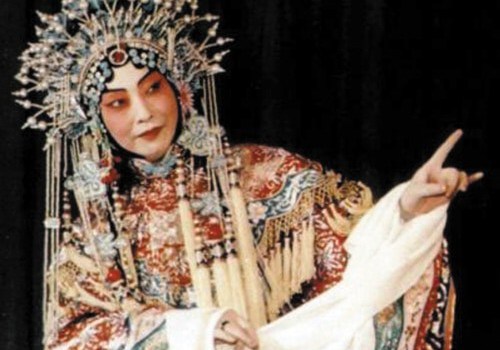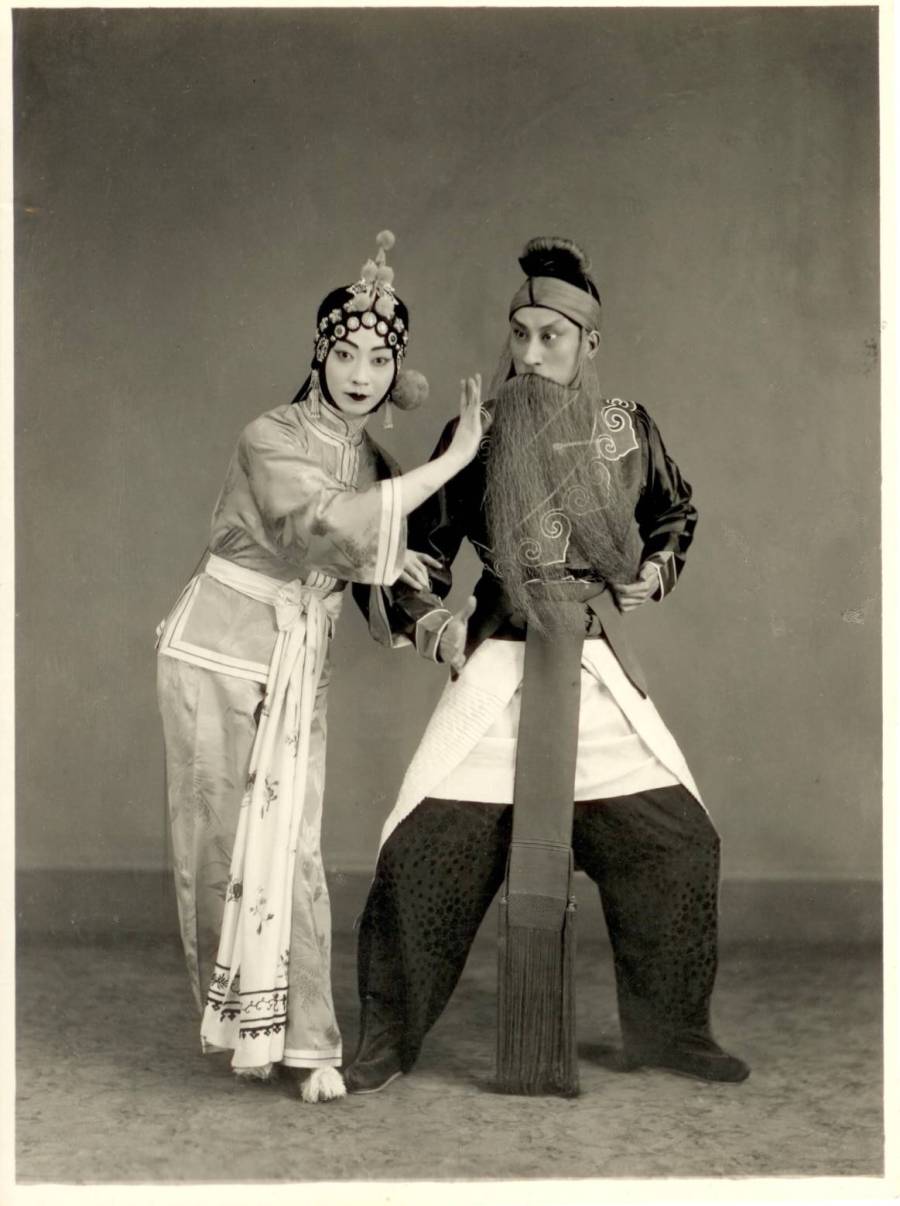
The introduction of dance into Chinese opera at the beginning of the last century massively changed how the Chinese people experienced opera. Previously, it was only listened to, but now strong aesthetic standards were being established and allowed people to express and experience the beauty of Opera in a different way.
The person who made this happen was Mei Lanfang.
Mei Lan Fang was a female impersonator, which sounds quite impressive for the turn of the 18th century, but it was normal at this time for men to take the female roles on stage. Mei managed to successfully ‘play’ a woman on the stage well into his 60s, and to retain the people’s interest over 50 years later.
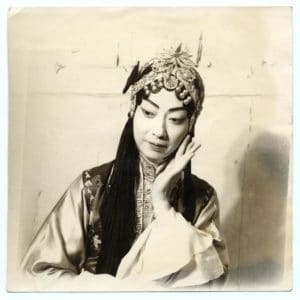
The Early Years of Mei Lan Fang
Mei Lan Fang 梅兰芳 (méi lán fāng) was born into a family that was not particularly well off, on 22nd October 1984. His grandfather, Mei Qiao Ling 梅巧玲 (méi qiǎo líng) had performed Peking Opera in front of the Dowager Cixi 慈禧太后 (cí xǐ tài hòu) of the Qing Dynasty 清朝 (qīng cháo) 1644 – 1911). Since the elite enjoyed watching Peking or Beijing Opera 京剧 (jīng jù), it also became fashionable for the common people too.
Both Mei Lan Fang’s father, Mei Zhu Fen and grandfather appear in a painting of the best Peking Opera performers made during the reigns of Tongzhi 同治 (tóng zhì) and Guangxu 光绪 (guāng xù).

Sadly, Mei’s father died when he was 4 years old, and whilst Mei’s uncle, Mei Yu Tian supported his brother’s family, the pressure was very quickly placed on Mei Lan Fang, as the only boy in the family, to follow in his father’s footsteps and become part of a Peking Opera troupe.
Performing troupes were like big families, and so the idea of a son following in his father’s footsteps was not uncommon. In fact, in those days children of opera performers had no choice but to become part of the opera. Although Mei Lan Fang went to school when he was very young, many schools refused to take performer’s children and so the opera was the only way to make a living.
Training Begins
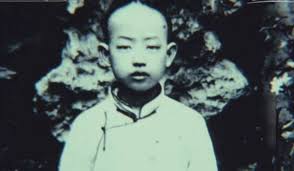
Once he turned 8, Mei Yutian set about finding a trustworthy teacher who could train Mei in the art of Peking Opera. He was initially taught by a former student of his grandfather’s, but Mei showed little talent and the teacher refused to teach him.
His family were extremely disappointed that Mei had not inherited his grandfather and father’s talent, and was described by an aunt 50 years later as being ‘inarticulate and bland looking’ as a child.
Eventually, a teacher took on the role of training Mei in the operatic techniques needed to perform. He was patient and after only 2 years of training, prepared Mei for his first performance.
The Jia family tea house, now known as the Guanghe theatre 广和楼 (guǎng hé lóu), was a prestigious establishment that actors were honoured to play at. In 1904, aged 10, Mei made his stage debut, although few people found him impressive.
Once he had been performing for some years, he joined a troupe, and the Mei family’s prospects greatly improved.
Mei’s constant diligence and dedication made up for his shortcomings. He learned the art of opera the ‘correct way’ and refused to take shortcuts.
Mei Lan Fang the ‘Dan’
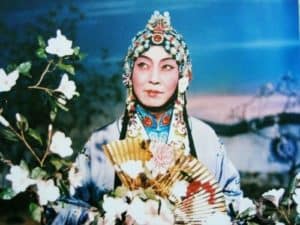
Mei took on the role of the ‘dan’ 旦 (dàn), specifically 青衣 (qīng yī). A ‘dan’ is a female role within Peking Opera, and during this time, women were not allowed to perform in opera so female roles were played by men. Later on, Mei also took on other ‘dan’ roles including 花旦 (huā dàn) a vivacious female role.
Mei stood out from other performers, and his ability to play any female role caused a stir in Beijing but marked him out as a star of Peking Opera.
His performance was different from traditional ones, and audiences were enthralled. After the end of the Qing Dynasty in 1911, women were able to visit the theatre, who particularly enjoyed the Dan roles played by Mei Lan Fang.
As Mei performed more and became extremely popular, following the path of other Peking opera stars, such as Tan Xin Pei 谭鑫培 (tán xīn péi) in order to become ‘King of Opera’. The more traditional performers were afraid that the old ways would be replaced by more modern techniques, music and dancing.
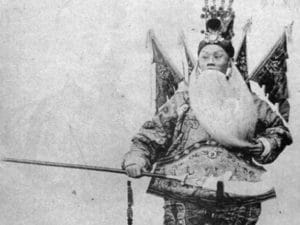
Mei Lan Fang and Tan Xin Pei became friends, and although Mei learned from him, he was beginning to reform Peking Opera and addressed contemporary issues that had previously been deemed inappropriate.
New plays began to appear in Beijing where people wore modern clothes and introduced new twists. The topics were about everyday subjects, such as feudal marriage. Although this modern type of opera did not survive, it was a sign of Mei’s desire to redesign Peking Opera for a contemporary audience.
In 1913, Mei was invited to perform in Shanghai and this was the first time he had travelled so far from home. He was given 2nd billing to Wang Fengqing the ‘Lao Sheng’ 老生 (lǎo shēng) or ‘elderly man’ performer.
Wang found out that some audience members had left once Mei had finished his performance. He told Mei that in future he would appear in the grand finale. Mei’s friends suggested that in order to change Peking Opera for the future, he should choose Peking Opera Blues 穆柯寨 (mù kē zhài) for his Grand Finale. 7 days later, Mei performed his new role and he became an overnight sensation.
From 1915 to 1916, Mei Lan Fang was extremely successful and was able to support his family. He was able to paint and practise plays with his friends in his spare time.
In 1916 he performed in The Story of Su San 玉堂春 (yù táng chūn), and people were amazed were his singing voice and applauded and cheered.
Reforming ‘Dan’ Roles and Peking Opera
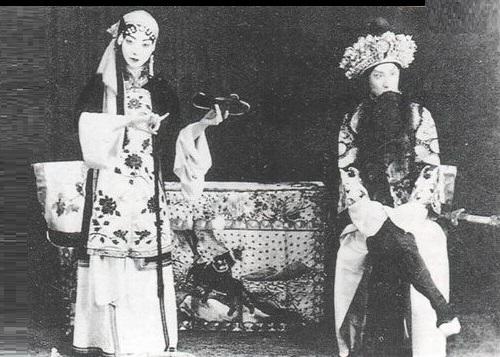
Mei Lan Feng performed the ‘dan’ role in ‘Goddess Chang’e Flying to the Moon’ 嫦娥奔月 (cháng é bèn yuè). The ‘dan’s’ singing and dancing won the hearts of the people.
For his performance in ‘Heavenly maid scattered blossoms’ 天女散花 (tiān nǚ sàn huā) Mei Lan Fang invented the ‘ribbon dance’ 长绸舞 (cháng chóu wǔ), a very unusual addition to a Peking opera.
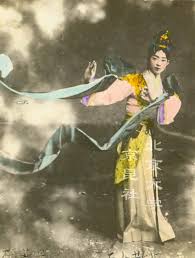
In 1922, he performed in ‘Farewell my Concubine’ 霸王别姬 (bà wáng bié jī) and changed the performances from the original so that the roles were reversed and the ‘Dan’ female character overshadowed the ‘Sheng’ or male character.
Mei worked on making ‘Dan’ characters more beautiful. He improved the hair and makeup styles of the Dan and made them more aesthetically pleasing for a contemporary audience. Mei Lan Fang was one of the first Dan performers to wear lipstick. He designed new costumes, especially for the character, Concubine Yu 虞姬 (yú jī). Finally, he created a completely new ‘sword’ dance 剑舞 (jiàn wǔ) for Concubine Yu to perform, which was completely unheard of before this point.
Mei Lan Fang the Icon
Even to this day, it is often asked how Mei Lan Feng managed to flawlessly move from handsome gentleman to elegant woman. He enthralled his audiences and was an ‘icon’ in China, even having a cigarette brand named after him. People would buy his photographs and pin them on their walls. He even had fans in the west who learned about Chinese culture and Peking Opera through him. One such fan was the poet, Rabindranath Tagore.
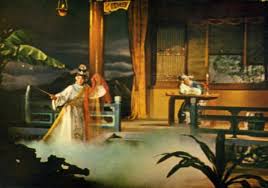
Mei performed his new opera, ‘Goddess of the Luo River’ 洛神 (luò shén) which began a new phase in his reform of Peking Opera. He used lines from ancient poetry and questioned new and old ideologies. Although at this time people were reevaluating the old traditions, they still realised that they were important.
Mei Lan Fang had never received a formal education, and so relied on his friends to teach him. He spent a lot of time discussing art and literature with critics and writers and they were largely responsible for helping Mei become successful and they were an integral part of what would become ‘The School of Mei’.
His well educated friends would suggest operatic plays, then they would work together to produce a script, stage design, music and vocals. These people were experts in their fields, but Mei always had the final say.
When discussing costumes, Mei would stand on a table dressed in one of the designs. The others would sit around and critique the design. They were meticulous about colour, style and it would not be approved until it was perfect.
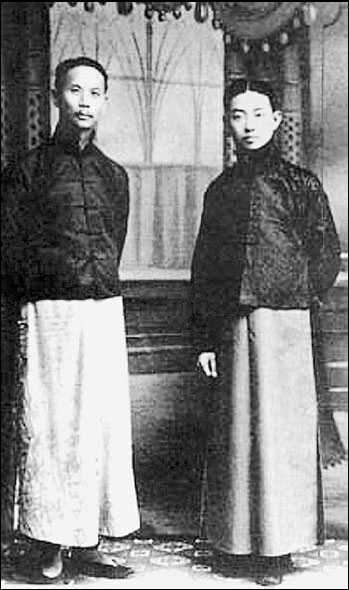
In the mid-1920s, Mei became friends with Qi Rushan 齐如山 (qí rú shān). Although they had communicated by letter for many years, because of their difference in education, Qi had never found it appropriate for them to meet in person. Qi had previously looked down on the art of Peking Opera until he was forced one evening to watch Mei perform. He began writing letters to Mei critiquing his performance and suggesting ways in which he could improve. Mei Lan Feng accepted and acted upon all of Qi’s suggestions.
After they eventually met through a mutual friend, Qi began to write many of Mei’s operas and also arranged his tours.
Peking Opera Goes On Tour
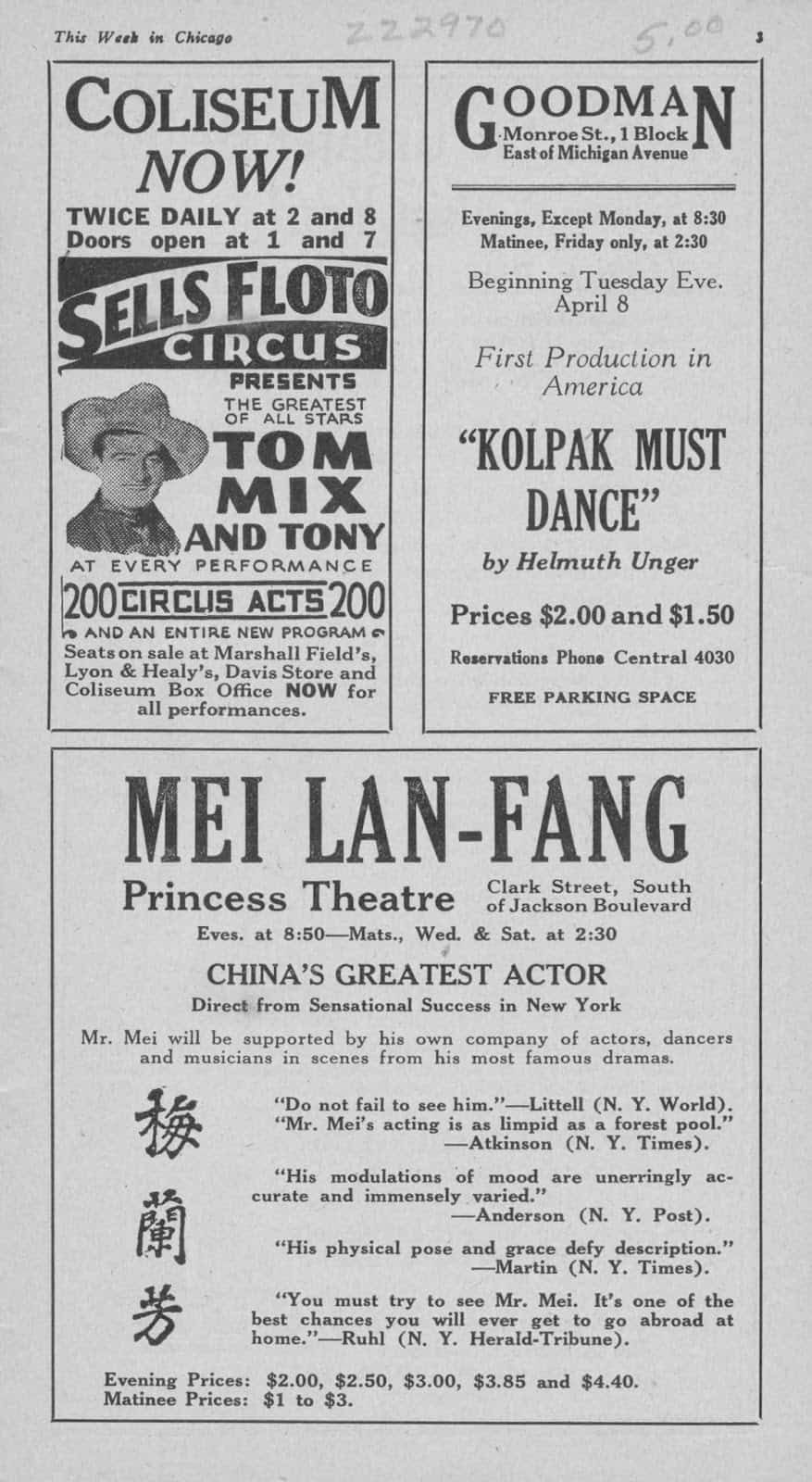
In 1930, Mei Lan Feng took his first trip to the USA and performed on Broadway in New York.
Peking Opera was completely unknown to most Americans, and he feared Opera would be unappreciated, let alone understood. His first performance at the 49th Street Theatre had a prologue presented in English to allow the audience to understand the storyline. Mei needed of worried as the audience found his performance enthralling and even forgot to applaud.
Mei continued his tour of America and even spent time with Charlie Chaplin and lived with Mary Pickford and Douglas Fairbanks in their home.
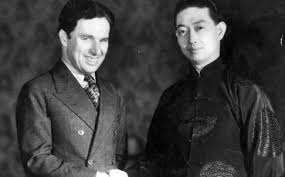
During Mei’s tour of the USA, drama critic Justin Brooks Atkinson once wrote in the New York Times: “You may feel yourself vaguely in contact, not with the sensation of the moment, but with the strange ripeness of centuries.”
To top off his trip, Mei Lan Feng received an honorary doctorate from the University of Southern California.
Mei performed 100 times in America before returning home in August of 1930.
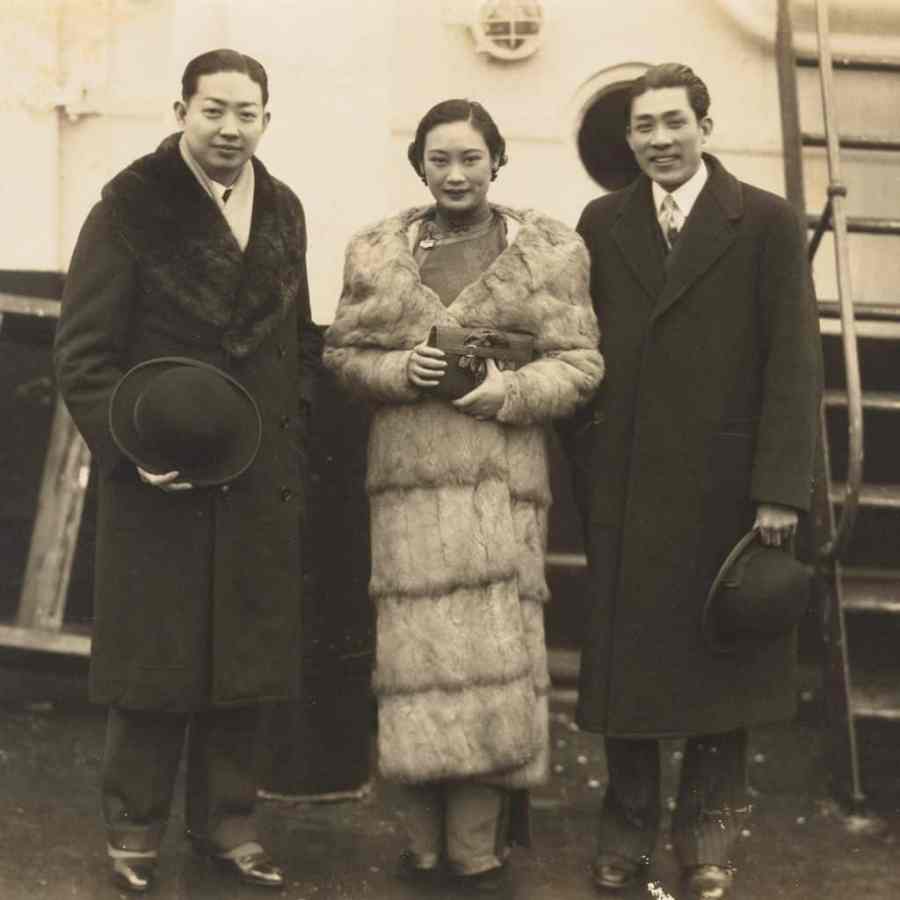
In 1935 Mei toured Russia. Most of the pictures of Mei used as advertising were stage images, so many people thought Mei was a woman. When Hu Die 胡蝶 (hú dié), the Chinese film star, who had accompanied Mei on his tour, walked down the street, people would shout ‘look, there’s Mei’.
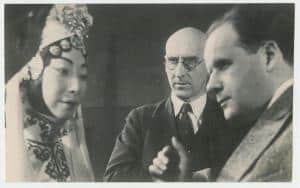
The director, Sergei Eisenstein recorded Mei during several of his performances. It was said that his performance greatly influenced the German poet and playwright, Bertolt Brecht, who later created a drama with eastern form.
Shanghai and Japanese Occupation
During the Sino-Japanese war, Mei Lan Feng moved to Shanghai, and performed to raise money and awareness of the Battle of Songhu with his opera, ‘Battle of the Jin Invaders’ 抗金兵 (kàng jīn bīng). It was at this time that Qi Rushan left his creative team, so Mei took charge and finalised all the musical compositions, dialogue and venues.
In 1937, Beijing and Shanghai were occupied by Japan and eventually, Mei Lan Feng and his troupe went to Hong Kong to perform and didn’t return to Shanghai.
From this point on, Mei Lan Feng refused to perform. He said that whilst Japan occupied China he had no desire to sing. As an act of defiance, Mei grew a moustache, meaning that he would no longer be able to play a ‘Dan’ role.
Once Japan occupied Hong Kong, he knew they would come looking for him. As a cultural icon of China, he would be forced to speak against his country. He was interviewed once and allowed to leave, at which point he left for Shanghai and was reunited with his family.
On returning to Shanghai he was told by Japanese officials that he would be a spokesperson for the Sino-Japanese friendship and that they were coming to take him.
His family hatched a plan to keep Mei with them. When Mei took a vaccine, he was known for becoming very ill, often with a high temperature. So, he was given a vaccine before the soldiers arrived to take him, and he was so ill he was unable to go with them. Afraid that the fever would not be enough to prevent the soldiers from taking him, he had a bottle of sleeping tablets on the table next to him…
Although his plan worked, Mei had not worked for a long time and had to sell his home in Beijing to support his family and troupe. He would send money and food to the troupe union to make sure other performers were supported.
Performing For ‘The People’
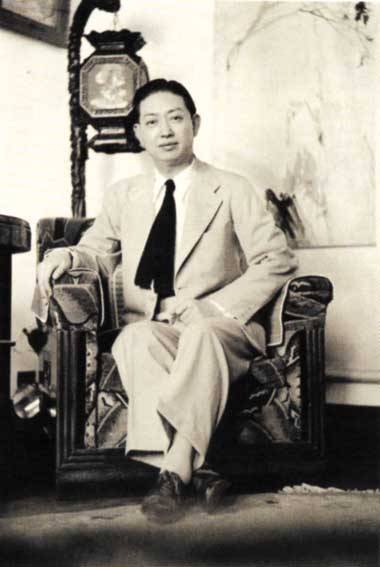
In 1945 the war ended. Mei Lan Fang’s friends went to his home to celebrate. On entering the room, Mei held a fan over his face. He suddenly whipped away the fan, and his moustache was gone!
In October 1945, Mei performed again in the Meiqi Theatre in Shanghai 上海美琪大戏院 (shàng hǎi měi qí dà xì yuàn). Since he hasn’t performed for many years, his voice was no longer as melodious, but the audience applauded just as loudly as before.
Mei decided to go back to Beijing and after 18 years, many things had changed. On his arrival in Beijing, Peking Opera performers waited at the station to welcome him back.
At this time, Mei became involved in many groups including becoming involved with government.
Mei Lan Feng believed that for the first time he was performing for ‘the people’. He performed in factories and rural areas, receiving huge audiences.
During this time, many of his performances were filmed and Mei fine-tuned every element of his performance to make sure it was perfect for the camera.
Mei continued to perform even up to his passing on August 8th, 1961.
The streets were full of people crying and many of his friends stopped performing after his passing.
Mei’s ‘School’ of Opera was continued by his son’s who also went on to play the role of the ‘dan’ in Peking Opera.
